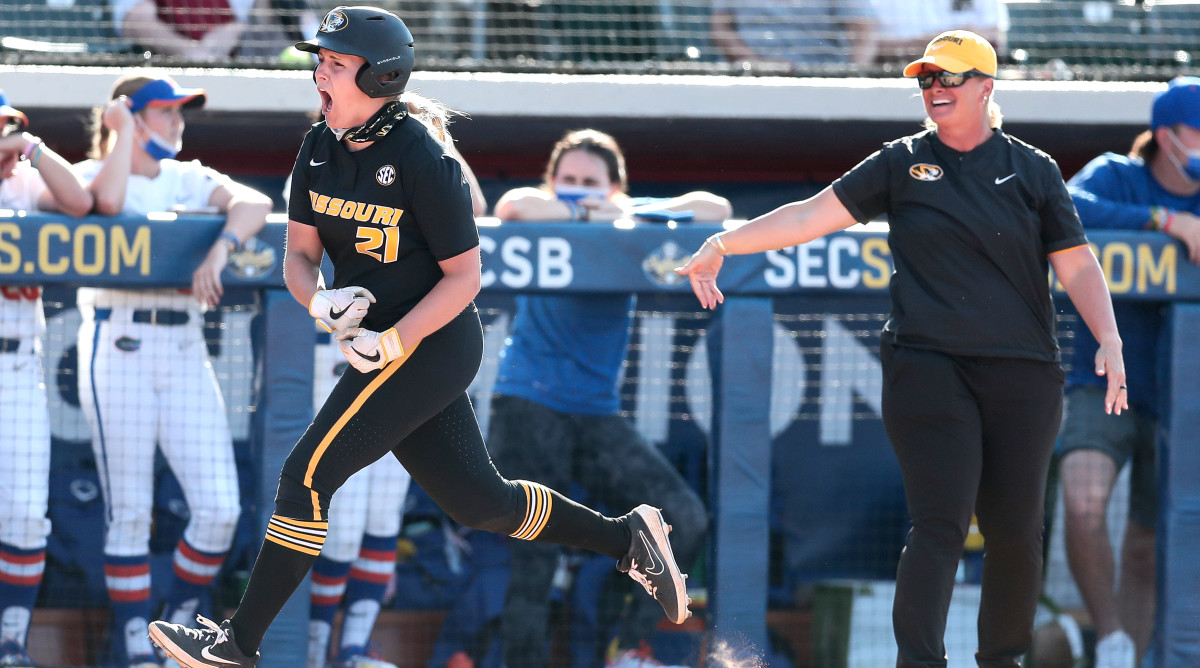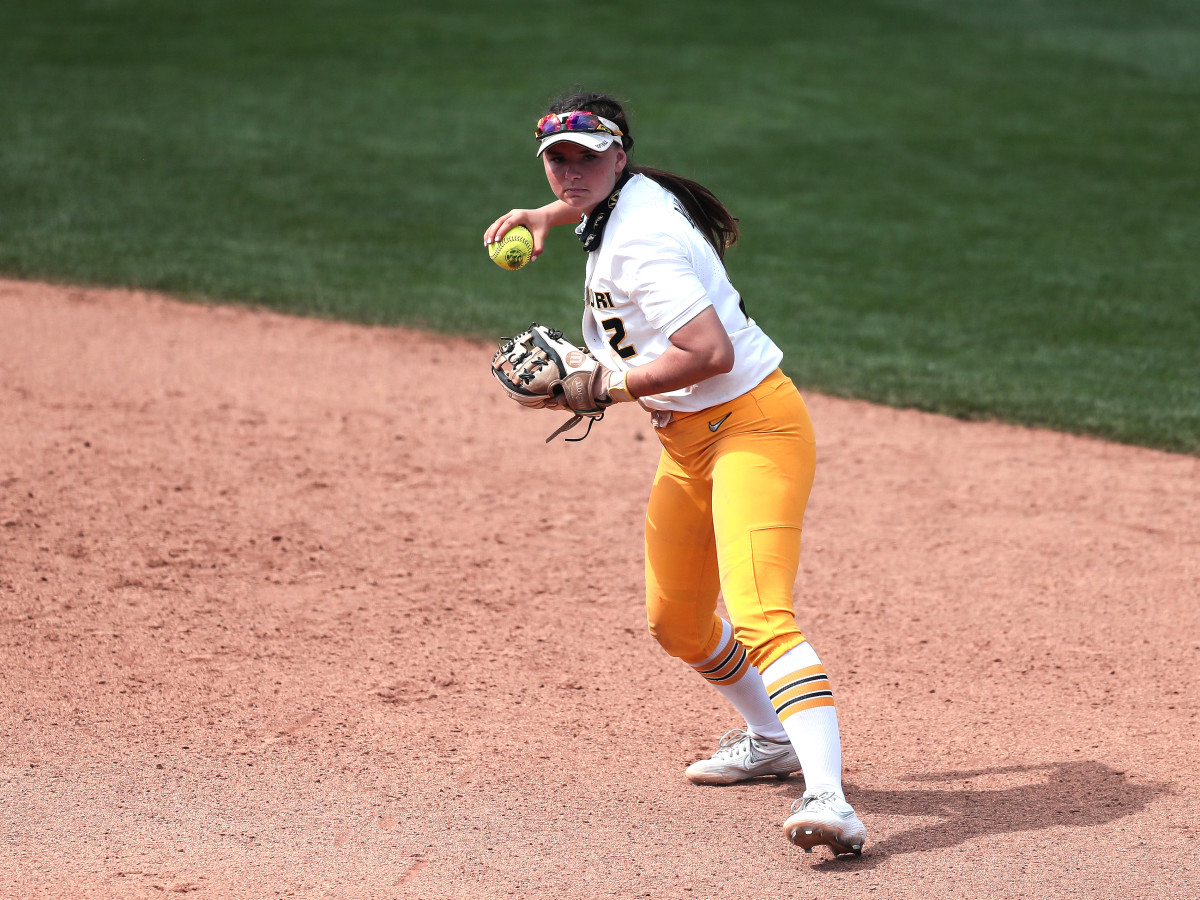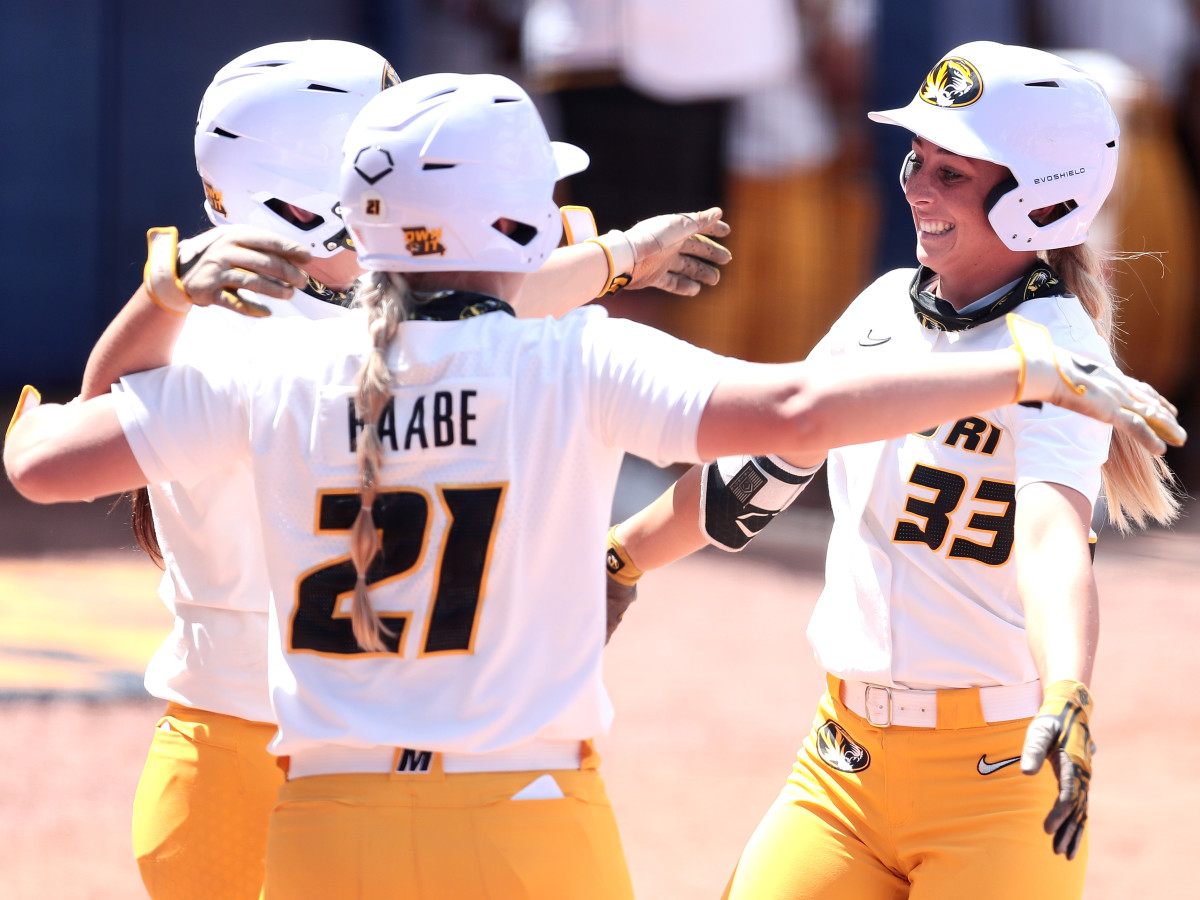From Controversy to Championship Culture: How Mizzou Softball Is Finding Success Again


Missouri softball has played its share of signature games against top teams this year, compiling a highlight reel of explosive offense plays and thrilling finishes. But for redshirt junior second baseman Kendyll Bailey, one that truly stands out is a blowout win from a February showcase.
The Tigers swept through their first four games of the South Alabama Invitational by a margin of 28–7 and were facing Middle Tennessee to finish the weekend. In the sixth inning, when bullpen catcher Katherine Kadlec stepped up to pinch-hit in her second career at bat, Mizzou needed just one run to put an end to the invitational an inning early.
There were two outs and Megan Moll at second was the only runner on base. Kadlec fouled off the first pitch. She took a big cut and missed at the second.
Down 0–2, Kadlec swung again, and knocked the ball into left field for her first career hit.
The Tigers erupted from the dugout as Moll reached home, giving them the 8–0 win in the sixth inning, but more important, giving an unheralded player a chance to shine.
“Seeing everyone so happy and rushing the field and seeing [Kadlec] cry and feeling so excited, that just truly shows who we are,” Bailey said. “Everyone is doing something every day that goes unseen for the whole team. Being down in the bullpen and then her getting called up, I think that was honestly the coolest moment.”
For a team that has been through a fair amount of upheaval in the last few years, the success is welcome, especially earning the No. 8 seed in the 2021 NCAA tournament. But for the Tigers, this season is more about playing for each other than for wins.
Leading that mentality is head coach Larissa Anderson, who has quickly turned around a program that was mired in controversy and struggled to live up to its potential. Her focus on people and instilling an “own it” mentality has given the Tigers a new energy.
That energy is palpable when Emma Raabe hits a home run out of the stadium, when Casidy Chaumont makes a diving catch in left field look routine and when an unsung bullpen catcher steps up to win the game.
“This year, it's unlike any other year that I've had. I think we're realizing it's coming to an end soon and we're not going to have the same team again, so we're truly cherishing every moment we have left,” Bailey said. “The culture is unreal and that's where [people] are seeing our success come from. It’s because we're having fun, and winning is just the product of it.”
Playing for each other, the Tigers have their eyes set on the Women’s College World Series in Oklahoma City. Now they’ll have the opportunity to get there by playing in front of their home fans in both the regionals and super regionals, should they advance.
Anderson first arrived in Columbia, Mo., as an associate coach for the Hofstra Pride, a longtime successful mid-major program that won 43 games in the regular season led by All-America pitcher Olivia Galati. The Pride were playing in a 2013 regionals game the Tigers were hosting.
Missouri and Hofstra advanced to the finals of the double-elimination regional, and the Pride crushed the Tigers 10–0 in five innings in the first match behind a four-hit game from Galati. Because it was Missouri’s first loss of the regional, they played a tiebreaking game.
Chelsea Thomas, the Tigers’ own All-American, pitched a one-hitter and Missouri won 5–0 to advance to the super regionals. It was a hard and emotional loss for a Pride team with six seniors, but the respect Missouri fans showed them made a lasting impression on Anderson.
“Everyone in the stands stayed and gave us a round of applause as we exited the field and then lined the walkway from our dugout to our bus just applauding our team,” Anderson said. “That just showed me the atmosphere that Mizzou had—the passion, the excitement for softball.”
Anderson spent 17 seasons at Hofstra, from 2002 to ‘18, and 10 of those seasons as associate head coach to Hall of Famer Bill Edwards, who built the Long Island school into a mid-major powerhouse. In her fourth year as head coach, Hofstra won 41 games, the conference title and advanced to the regional finals. She knew Power 5 schools would be calling. The University of Missouri made the first move.
Mizzou athletic director Jim Sterk and five other associate athletic directors and deputies flew to Long Island two days after the season ended to meet with Anderson. Sterk made it clear that a quick return to the World Series wasn’t the top priority. He expected her to build a culture.
She flew to Columbia the next day, and signed on.
“I was part of a program for 17 years that had such an unbelievable, rich tradition and legacies that were left by a number of players. I knew all about culture and family and really how to build a program,” Anderson said. “I'm going to concentrate on people. And that's really what we've been doing from Day One, is making sure we have the right people in the program to be able to build what we wanted to build.”
Missouri softball has its own tradition of success. Former coach Ehren Earleywine built the Tigers into a consistent contender—including three straight trips to the World Series when Mizzou was still in the Big 12.
But Earleywine’s 11-year tenure ended in controversy. The athletic department criticized his coaching style. The school investigated him over internal and external complaints, and one of his players was involved in a 2016 academic cheating scandal that led to postseason bans for the Tigers’ softball, baseball and football teams.
In Earleywine’s final season, the Tigers—a perennial 40-win club—tumbled near the bottom of the SEC standings with a 29–28 record and didn’t win a single game in the postseason.
Earleywine was fired 12 days before the 2018 season, and Mizzou struggled again under interim head coach Gina Fogue. Several players transferred by the end of the year, and the Tigers finished last in the conference, not even qualifying for the SEC tournament hosted at Missouri’s brand-new stadium.
It was a frustrating time for a program used to winning. Anderson said that when she arrived ahead of the 2019 season, there was a lot of the “blame game” being played.
She had a different approach, represented by the team’s new motto: Own it. Every member of the team accepts responsibility for their own mistakes, and every member of the team, together, accepts responsibility for the team’s successes and failures.

During Anderson’s first season in 2019, the Tigers had a rough loss in a midweek game. Anderson said the team played poorly and the players weren’t focused. She asked them after the game why they came to Missouri. The room fell silent for what felt like 10 minutes, before someone answered to play in the College World Series.
“Okay, that's step one,” Anderson said. The team had its purpose. “How are we going to get there?”
Anderson describes herself as a disciplinarian, but every action—from ground ball drills to walking in a single file to games—has a reason she can explain and serves the team’s purpose. The little things give them a shot at the big thing, she said—the College World Series.
Redshirt senior Cayla Kessinger has seen the culture shift firsthand. She was a sophomore during the 2018 season and said the coaching change came as a shock to everyone on the team. When Anderson was hired, she was Kessinger’s third coach in less than six months.
Now during Anderson’s third year, Kessinger sees the impact that having a culture of support, discipline and purpose has done for the team. The players know how to work toward a common goal, and everyone knows exactly what they are trying to accomplish together.
“We're genuinely playing for each other—success, failure, you name it,” Kessinger said. “At the end of the day, we have each other's backs, and I think that you really can't ask for anything more on a team.”
Bailey joined the team in 2018 before Anderson was hired and admitted that it was a difficult transition, but said the Tigers are now reaping the benefits of Anderson’s coaching style. It’s now leading to wins, and it’s only the beginning, she said.
“This year and in the coming years, you're actually going to see who Mizzou softball is,” Bailey said, “and how close we are, and how we work as a team.”
When the NCAA announced Mizzou would be banned from the 2020 postseason, Anderson feared she could lose everyone to transfers or opt-outs. She couldn’t blame them if they did leave, she said. They had collectively set a goal to play in the NCAA tournament.
Catcher Hatti Moore was the first player to tell Anderson that she had worked too hard with her teammates to miss a season playing with them. They all agreed—not one player left the program that year.
“You're trying to build a program, and then your ultimate goal is taken away from you,” Anderson said. “As a coach, my whole entire life has been focused on winning, and has been focused on championships, and now we don't have the possibility—so what is going to be our championship? It was going to be having a championship culture. That was going to be our No. 1 goal.”
Kessinger missed the 2019 season after she having surgery for thoracic outlet syndrome, a painful disorder that compresses blood vessels or nerves in the neck and chest area. She said the experience taught her not to take the small things for granted, and she leaned on the support of her teammates to get through the grueling rehab and physical therapy.
By 2020, she was playing on another level.
Kessinger earned All-America honors last year, and was batting .429 with six home runs when the season ended after 26 games due to the COVID-19 pandemic. She made the most of her teammates’ success and drove in 32 runs, after she had 39 total RBIs over the 102 games she played in her first two seasons.
The Tigers, 19–7 by the time the season was canceled in March, were only one of two teams to sweep an SEC series that year. Anderson had taught them that winning meant focusing on Missouri softball and giving their best effort, and they did.
“Even if it was a full season and we just played the game we played every single day, that was our championship,” Kessinger said. “We don't care what we've been through, we're going to play the way that we know how to play.”
Ever since Missouri learned last summer that its postseason ban was lifted, the team has been all in on returning to the College World Series in 2021 for the first time since it was Big 12 champions in '11—a path that now begins at home in Columbia, Mo.
Behind a home-run-fueled lineup and showstopping defense, the Tigers have been a force in SEC play. Picked to finish eighth in the conference, Missouri ended the season fourth behind Florida, Alabama and Arkansas—all of which also have their sights set on Oklahoma City.
The team was aware of the low expectations others had set for it. Junior Raabe remembered reading on softball blogs that LSU had a 90% chance of winning when they faced off in early April. LSU scored one run in the first inning, but Missouri scored the next nine, and sent LSU home in the fifth inning on a run rule.
“That’s when we were like, we just turned a lot of heads,” Raabe said.

Missouri dropped the next two games to LSU, but went on to win a series against Arkansas and handed Florida its only run-rule loss of the season. Facing Florida again in the SEC championship semifinals, the Tigers rallied in the seventh inning when Raabe—down to the last strike of the game—crushed a three-run home run to put the Tigers up by one, before Florida capitalized on a few rare defensive mishaps to walk off with a one-run win.
The team’s real goal still lies ahead. The Tigers expected to host a regional, but clinching the No. 8 seed means they will host a super regional in Columbia if they advance that far. Mizzou will face off against University of Illinois at Chicago to open the first round of the NCAA regional on Friday afternoon—the first step to a berth in the College World Series, Anderson said.
“You have to think about what they have overcome in a very, very short period of time, and what they're accomplishing,” Anderson said of her players. “They deserve so much credit to be where they are right now, and that's probably the most frustrating thing is when they don't get it.”
Anderson will fight for her players to get the recognition they’ve earned, but the team doesn’t seem to mind being underdogs. The Tigers are playing for each other, and anything from the outside that counts them out is just fuel for their fire, Kessinger said.
“We're always picked to lose. Always. And it's like, you know what, let them think that,” Kessinger said. “If they don't want to pay attention, fine. We're going to make a name for ourselves.”
More From GoodSport:
- Key Players for Each WNBA Team in 2021
- Meet Pepper Persley: The 10-Year-Old Reporter Making a Name for Herself
- A Star in Stripes: Official Desiree Abrams Is Breaking Into the NFL's Boys' Club
Jacqueline LeBlanc is a contributor for GoodSport, a media company dedicated to raising the visibility of women and girls in sports.
